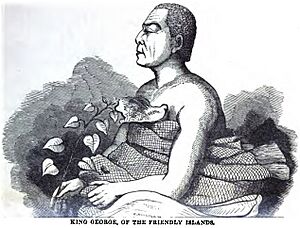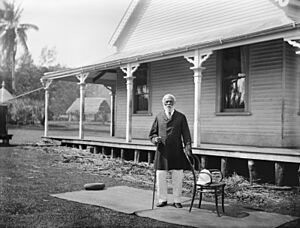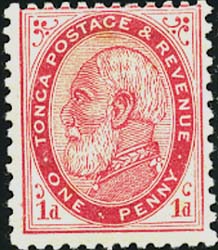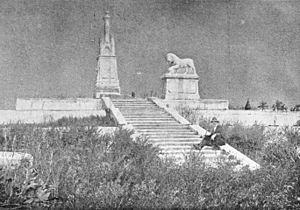George Tupou I facts for kids
Quick facts for kids Siaosi Tupou I |
|
|---|---|
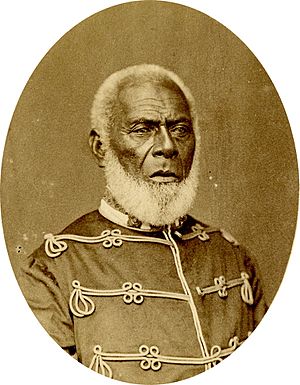 |
|
| King of Tonga | |
| Reign | 4 December 1845 – 18 February 1893 |
| Coronation | 4 November 1875 |
| Predecessor | Position established |
| Successor | Siaosi Tupou II |
| Prime Ministers | Tēvita ʻUnga Shirley Waldemar Baker |
| Born | Tāufaʻāhau 4 December 1797 Kahoua, Tonga, Polynesia |
| Died | 18 February 1893 (aged 95) Nukuʻalofa, Tonga, Polynesia |
| Burial | Malaʻe Kula |
| Spouse | Sālote Lupepauʻu |
| Issue | Tēvita ʻUnga Sālote Mafileʻo Pilolevu Tuʻukitau Vuna Takitakimālohi |
| House | Tupou |
| Father | Tupoutoʻa |
| Mother | Hoamofaleono |
| Religion | Tongan religion (former) Free Church of Tonga |
George Tupou I (born 4 December 1797 – died 18 February 1893) was the first king of modern Tonga. His original name was Tāufaʻāhau I. In 1831, he was baptized and chose the name Siaosi, which is the Tongan version of George. He picked this name after King George III of the United Kingdom. People also called him Lopa-ukamea, meaning iron cable, because he was so strong and determined.
Contents
The Life of King George Tupou I
Early Life and Family
George Tupou I was born around 1797 in Tonga. December 4 is often celebrated as his birthday and is a public holiday in Tonga. However, this date is actually when he became the Tu'i Kanokupolu in 1845 and took the name Tupou.
His father was Tupoutoʻa. His mother, Hoamofaleono, felt unsafe in Tongatapu and moved with her son to Haʻapai shortly after he was born. This is why much of his early history is linked to Haʻapai Island.
Becoming a Leader
George Tupou became the High King of Haʻapai before his father passed away in 1820. He faced challenges from Laufilitonga, the last Tuʻi Tonga, who wanted more political power. This led to the Battle of Velata in 1826, where Tāufaʻāhau won.
After this victory, it was clear Tāufaʻāhau wanted to unite all of Tonga. To try and stop him, the chiefs of Tongatapu made Laufilitonga the Tuʻi Tonga in 1827. They also made Tāufaʻs uncle, Aleamotuʻa, a Tuʻi Kanokupolu. This was meant to prevent fighting, as Tongans did not like to fight family members.
Despite this, when Tāufaʻāhau was baptized in 1831, he declared himself King George of Tonga. He then gained control of Vavaʻu after its ruler, Fīnau ʻUlukālala III, died in 1833. In 1839, he dedicated Tonga (specifically Pouono in Vavaʻu) to God. This helped him gain support from missionaries.
Uniting Tonga
During the 1830s, Tāufaʻāhau lived in Vavaʻu, which was peaceful and thriving. Meanwhile, Tongatapu was suffering from civil war among its chiefs. Tāufaʻāhau launched attacks on Tongatapu with his strong warriors from Haʻapai and Vavaʻu.
When his uncle Aleamotuʻa died, Tāufaʻāhau had a reason to conquer Tongatapu. The chiefs there were forced to accept him. On December 4, 1845, he was officially made Tuʻi Kanokupolu in Kolovai. Later, he gained control of Niuafoʻou and Niuatoputapu.
By 1852, Tāufaʻāhau was the undisputed leader of all Tonga. His rule brought many important changes. In 1835, he ended serfdom (a system where people were tied to the land) in Vavaʻu. In 1838, he created the Vavaʻu Code, which were the first written laws in Tonga.
He opened the first parliament on June 4, 1862. This day is still celebrated as Emancipation Day in Tonga, marking the freedom of the people.
He first made Pangai Haʻapai the capital of his kingdom in 1845. Then, in 1851, he moved the capital to Nukuʻalofa. On November 4, 1875, the Constitution of Tonga was put into effect, and Tonga officially became a kingdom. It was then that Siaosi officially took the name George Tupou I, King of Tonga.
Later Years and Passing
King George Tupou I died in 1893 at the age of 95, after swimming near his palace. He was buried in the New Royal Cemetery in Malaʻekula.
Since his children had passed away before him, his great-grandson, George Tupou II, became the next king. This makes George Tupou I one of only two monarchs in history known to be succeeded by a great-grandson.
King George Tupou I's Legacy
King Siaosi I's strong leadership made Tonga's history different from other Polynesian islands. He was respected by foreign powers, which helped protect Tonga from being colonized.
During a trip to Australia and New Zealand in 1853, he saw beggars who had no land to work on. This experience led to a very important part of the Tongan constitution. It states that land in Tonga can only be given to people born in Tonga and cannot be sold to outsiders. This rule is still in place today.
Family tree
|
|||||||||||||||||||||||||||||||||||||||||||||||||||||||||||||||||||||||||||||||||||||||||||||||||||||||||||||||||||||||||||||||||||||||||||||||||||||||||||||||||||||||||||||||||||||||||||||||||||||||||||||||||||||||||||||||||||||||||||||||||||||||||||||||||||||||||||||||||||||||||||||||||||||||||||||||||||||||||||||||||||||||||||||||||||||||||||||||||||||||||||||||||||||||||||||||||||||||||||||||||||||||||||||||||||||||||||||||||||||||||||||||||||||||||||||||||||||||||||||||||||||||||||||||||||||||||||||||||||||||||||||||||||||||||||||||||||||||||||||||||||||||||||||||||||||
See also
 In Spanish: Jorge Tupou I de Tonga para niños
In Spanish: Jorge Tupou I de Tonga para niños
 | Kyle Baker |
 | Joseph Yoakum |
 | Laura Wheeler Waring |
 | Henry Ossawa Tanner |


